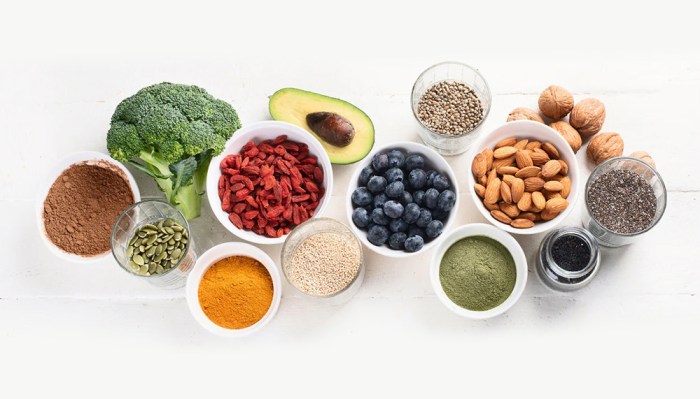Superfoods benefits are like the cool kids in the cafeteria, packed with nutrients and ready to take your health to the next level. From boosting energy to fighting off diseases, these powerful foods are here to revolutionize your diet and lifestyle.
Get ready to dive into the world of superfoods and discover how these nutrient powerhouses can supercharge your health and well-being.
Definition of Superfoods
Superfoods are nutrient-rich foods that are considered to be especially beneficial for health and well-being. These foods are packed with vitamins, minerals, antioxidants, and other essential nutrients that can help support overall health.
Examples of Popular Superfoods
- Kale: High in vitamins A, C, and K, as well as fiber and antioxidants.
- Blueberries: Packed with antioxidants that can help reduce inflammation and improve brain function.
- Quinoa: A complete protein source, rich in fiber, vitamins, and minerals.
- Chia Seeds: High in omega-3 fatty acids, fiber, and antioxidants.
Nutritional Benefits of Superfoods
- Boosting immune system: Superfoods like berries and leafy greens can help strengthen the immune system.
- Improving heart health: Foods like salmon and nuts can support heart health by reducing inflammation and cholesterol levels.
- Enhancing brain function: Omega-3 fatty acids found in superfoods like walnuts and flaxseeds can support brain health and cognitive function.
Health Benefits of Superfoods
Superfoods are packed with essential nutrients that can have a positive impact on your overall health and well-being. By incorporating these nutrient-dense foods into your diet, you can experience a wide range of health benefits that regular foods may not provide.
Nutritional Value Comparison
When comparing superfoods to regular foods, superfoods often contain higher levels of vitamins, minerals, antioxidants, and other beneficial compounds. For example, blueberries are considered a superfood due to their high levels of antioxidants, such as anthocyanins, which are known for their anti-inflammatory properties. In contrast, regular fruits may not offer the same level of antioxidant benefits.
Improved Health Aspects
Incorporating superfoods into a balanced diet can lead to improved heart health, enhanced brain function, better digestion, increased energy levels, and stronger immune system. For instance, salmon, a superfood rich in omega-3 fatty acids, can help reduce inflammation and lower the risk of heart disease. Regular foods may not offer the same level of heart-healthy benefits.
Types of Superfoods: Superfoods Benefits

When it comes to superfoods, there are various categories that offer unique health benefits. Incorporating a variety of superfoods into your diet can help boost your overall well-being and support specific health conditions.
Berries
Berries such as blueberries, strawberries, and raspberries are packed with antioxidants, vitamins, and fiber. These superfoods are known for their anti-inflammatory properties and can help improve heart health, boost brain function, and enhance skin health.
Leafy Greens
Leafy greens like spinach, kale, and Swiss chard are rich in vitamins, minerals, and phytochemicals. These superfoods are excellent sources of folate, iron, and calcium, and can help reduce the risk of chronic diseases, including heart disease and cancer.
Seeds
Seeds like chia seeds, flaxseeds, and pumpkin seeds are high in omega-3 fatty acids, fiber, and protein. These superfoods are beneficial for gut health, weight management, and reducing inflammation in the body. They can also support healthy skin and hair.
Cruciferous Vegetables
Cruciferous vegetables such as broccoli, cauliflower, and Brussels sprouts contain compounds that have been linked to cancer prevention. These superfoods are rich in vitamins C, K, and E, as well as fiber, and can support detoxification and immune function.
Whole Grains
Whole grains like quinoa, brown rice, and oats are excellent sources of fiber, protein, and essential nutrients. These superfoods can help regulate blood sugar levels, promote digestive health, and reduce the risk of obesity and type 2 diabetes.
Root Vegetables
Root vegetables such as sweet potatoes, carrots, and beets are loaded with vitamins, minerals, and antioxidants. These superfoods are known for their anti-inflammatory properties and can support healthy digestion, immune function, and cardiovascular health.
Superfoods and Disease Prevention

Superfoods play a crucial role in preventing chronic diseases by providing essential nutrients that support overall health and boost the immune system.
Examples of Disease-Fighting Superfoods, Superfoods benefits
- Blueberries: Known for their high levels of antioxidants, blueberries help reduce inflammation and lower the risk of heart disease.
- Spinach: Packed with vitamins, minerals, and antioxidants, spinach can help protect against certain types of cancer and improve heart health.
- Salmon: Rich in omega-3 fatty acids, salmon is beneficial for brain health and reducing the risk of heart disease.
- Turmeric: Contains curcumin, a powerful antioxidant with anti-inflammatory properties that may help prevent and manage chronic diseases like cancer and arthritis.
Role of Antioxidants and Nutrients
Antioxidants found in superfoods help neutralize free radicals in the body, which can damage cells and lead to chronic diseases. Nutrients like vitamins, minerals, and phytochemicals in superfoods support various bodily functions and contribute to overall well-being.